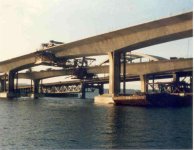mikehaugen
Elite Member
A while back I cut down some posts at work. They are 6" round tubing filled with concrete- not sure if it's 1/4" or 3/16", I'll have to check. I cut them flush with the concrete floor with a torch and boy was there a lot of popping. Anyway, I want to weld some together but not sure if it is a good idea. I would plan to weld some angle to them for 3 point brackets for counterweight.
I would have to imagine that there is still some sort of moisture in them and would possibly build pressure inside. Since they are round I don't anticipate a lot of contact area, so at most I'm thinking maybe 3/4" long welds. Would enough heat build up from short welds like that? Do you think they will blow up in my face? Am I worrying too much?
I would have to imagine that there is still some sort of moisture in them and would possibly build pressure inside. Since they are round I don't anticipate a lot of contact area, so at most I'm thinking maybe 3/4" long welds. Would enough heat build up from short welds like that? Do you think they will blow up in my face? Am I worrying too much?
